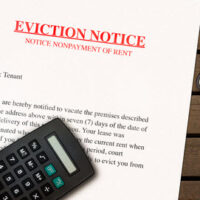How to Evict a Commercial Tenant in Florida

As brick-and-mortar businesses around the country struggle, the propensity for landlord and tenant disputes to erupt is on the rise. Many of these disputes involve the failure to pay rent on time. This can lead a commercial real estate landlord to look into legal options to evict the tenant in favor of someone new who will pay in a timely manner. However, eviction in Florida is not necessarily easy — especially for commercial landlords. Because the laws are very strict on how this is handled, it’s imperative to speak with a West Palm Beach commercial real estate attorney first.
Here are some important facts you need to know about evicting a commercial tenant:
Look at Your Lease First
First, you need to check your lease before looking to start an eviction hearing. Leases are binding, provided they do not violate any lease laws in the state. Your tenant signed the lease, so if there are provisions they suddenly think are unfair, they are still obligated to abide by it. Comb through the lease to see if there are any other potential violations, as that is the easiest place to start.
Evicting a Commercial Tenant is a Similar Process to Residential Evictions
The most common reason for eviction related to breach of commercial lease is unpaid rent. The unfortunate thing is that the process for evicting a commercial tenant is similar to the residential tenant process. This means it can take a little time. First, you must give the tenant a ten-day written notice that demands they pay the rent owned or move out.
If they fail to do either one once the ten days have passed, then you have to file a lawsuit. This officially starts the eviction process and the court will essentially do what you just did — demand they pay rent or vacate. In some situations, the court may award you damages for the trouble you had to go through.
Florida Does Not Allow Self-Eviction
You may be tempted to take matters into your own hands with a tenant in default, but that would go against Florida’s eviction laws. You cannot change the locks or remove the tenant’s property, nor can you order the utilities to be shut off unless you have a court order allowing you to proceed with one of these options. If you do a self-eviction without going to court, you could find yourself facing the responsibility to pay for the tenant’s legal fees, court costs, and any profit loss from their business.
Attempting an Eviction on Your Own is a Bad Idea
As a commercial landlord in Florida, one of the most important things you can do is have a West Palm Beach commercial real estate attorney on retainer if possible. While you think you may be saving money by handling a commercial eviction on your own, you could wind up creating additional stress for yourself. Don’t make a costly mistake by not contacting an attorney for help. Call the Law Offices of Larry E. Bray, P.A. to schedule an initial consultation. Let us show you how we can help with all your commercial real estate needs.
https://www.braylawoffices.com/common-causes-of-commercial-real-estate-disputes-in-florida/

